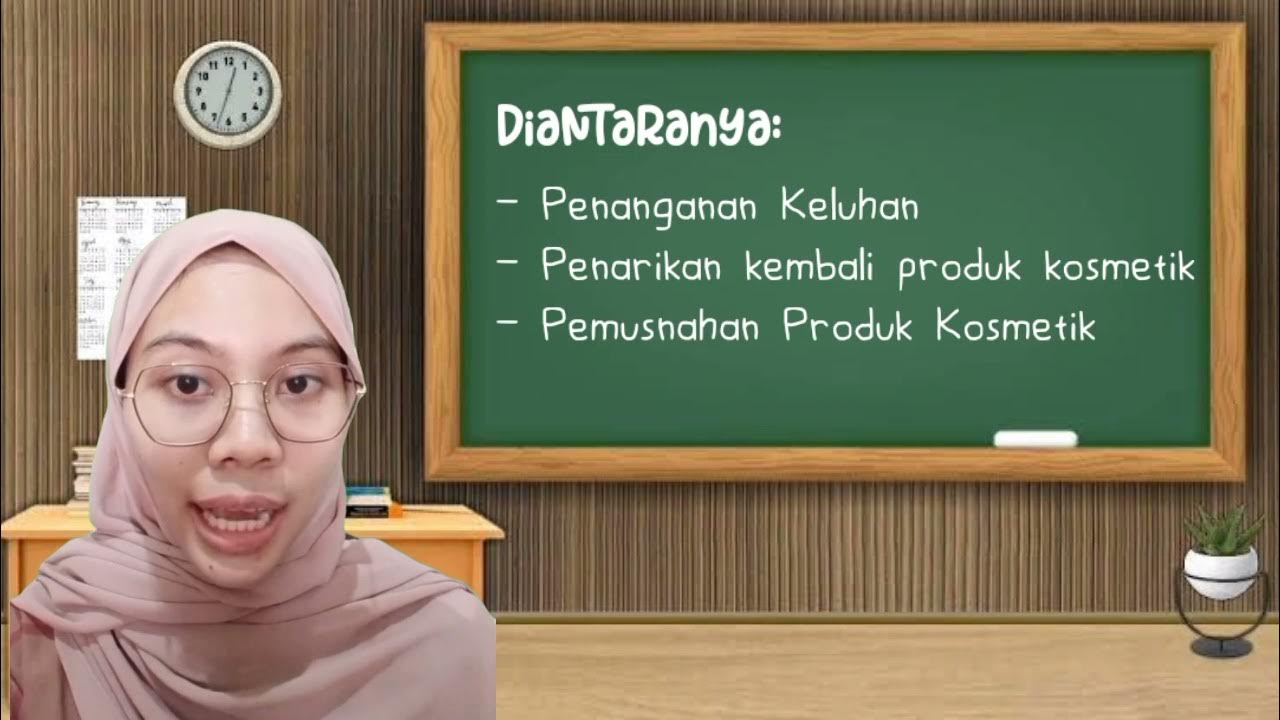Video 1 CPOB
Summary
TLDRThis educational video introduces the core principles of Good Pharmaceutical Manufacturing Practices (CPoB) based on Indonesia’s 2024 regulations. It emphasizes the importance of an effective pharmaceutical quality system, highlighting the responsibilities of management, quality assurance, production, and quality control personnel. The video covers the recruitment, training, and continuous education required to maintain high standards in pharmaceutical manufacturing. By ensuring that the entire system is well-designed and properly implemented, the video aims to underscore the significance of both a strong quality management system and qualified, well-trained personnel in producing safe and effective medicines.
Takeaways
- 😀 The quality management system (QMS) in the pharmaceutical industry ensures the production of safe and effective drugs that meet regulatory standards.
- 😀 Top management plays a crucial role in ensuring that the QMS is effectively implemented, with adequate resources and clear roles and responsibilities.
- 😀 A comprehensive QMS includes planning, control, and continuous improvement to meet the established quality targets.
- 😀 The QMS must comply with Good Manufacturing Practices (CPoB) and risk management standards to guarantee product safety.
- 😀 Personnel in the pharmaceutical industry must be qualified and trained to understand and apply CPoB principles at all levels of production.
- 😀 Personnel management includes recruitment, initial training, ongoing development, and performance evaluations to ensure continuous competence.
- 😀 The recruitment process should be strict, involving assessments of qualifications, experience, interviews, and competency tests.
- 😀 Continuous training is essential for ensuring that personnel stay up-to-date with the latest CPoB practices and production technologies.
- 😀 Performance evaluations should be conducted regularly to ensure staff competence and address any skills gaps through additional training.
- 😀 Proper personnel management leads to smooth production processes, improved product quality, and reduced risks of errors and contamination.
- 😀 The goal of a well-implemented QMS and skilled personnel is to produce pharmaceutical products that are consistently safe, high-quality, and in compliance with legal regulations.
Q & A
What is the purpose of the video on Good Manufacturing Practice (CPoB)?
-The purpose of the video is to educate viewers on the Good Manufacturing Practice (CPoB) standards in the pharmaceutical industry, focusing on quality management systems and personnel responsibilities to ensure safe and effective drug production.
What does a quality management system in the pharmaceutical industry involve?
-A quality management system involves all activities related to managing policies, objectives, responsibilities, and the implementation of quality planning, control, monitoring, and improvement to ensure safe and effective drug production.
Why is a quality management system essential in the pharmaceutical industry?
-It is essential because it ensures that drugs are produced in a way that meets the intended purpose, complies with regulations, and most importantly, does not pose a risk to patient safety due to inadequate quality, safety, or effectiveness.
What role does top management play in the pharmaceutical quality management system?
-Top management is responsible for setting quality policies, ensuring adequate resources are available, and communicating and implementing the roles, responsibilities, and authorities across the organization to support the quality management system.
What are the key responsibilities of personnel in the pharmaceutical manufacturing process?
-Key personnel responsibilities include establishing quality policies, overseeing quality management systems, ensuring proper production practices, ensuring compliance with regulations, and evaluating and training staff to maintain product quality.
Why is the recruitment process critical for pharmaceutical personnel?
-The recruitment process is critical to ensure that personnel possess the necessary qualifications and experience to meet the strict regulatory and operational standards required for safe and effective drug production.
What are the steps involved in training personnel in the pharmaceutical industry?
-Training involves initial orientation about the company’s policies and procedures, continuous education to stay updated on CPoB regulations, and performance evaluations to identify additional training needs and maintain competence.
What is the role of personnel responsible for quality assurance?
-Personnel responsible for quality assurance ensure the effective implementation of the quality management system, supervise audits, manage supplier audits, validate processes, and approve products for sale based on compliance with regulations.
How does the video explain the importance of ongoing performance evaluation for personnel?
-Ongoing performance evaluation ensures that personnel continue to meet the required qualifications and standards. It helps identify areas for improvement, ensuring that all personnel are competent and up-to-date with industry standards.
What benefits does effective personnel management bring to a pharmaceutical company?
-Effective personnel management ensures smooth production processes, reduces the risk of errors or contamination, enhances product quality, and fosters a positive work culture that boosts employee satisfaction and motivation.
Outlines

This section is available to paid users only. Please upgrade to access this part.
Upgrade NowMindmap

This section is available to paid users only. Please upgrade to access this part.
Upgrade NowKeywords

This section is available to paid users only. Please upgrade to access this part.
Upgrade NowHighlights

This section is available to paid users only. Please upgrade to access this part.
Upgrade NowTranscripts

This section is available to paid users only. Please upgrade to access this part.
Upgrade Now5.0 / 5 (0 votes)





